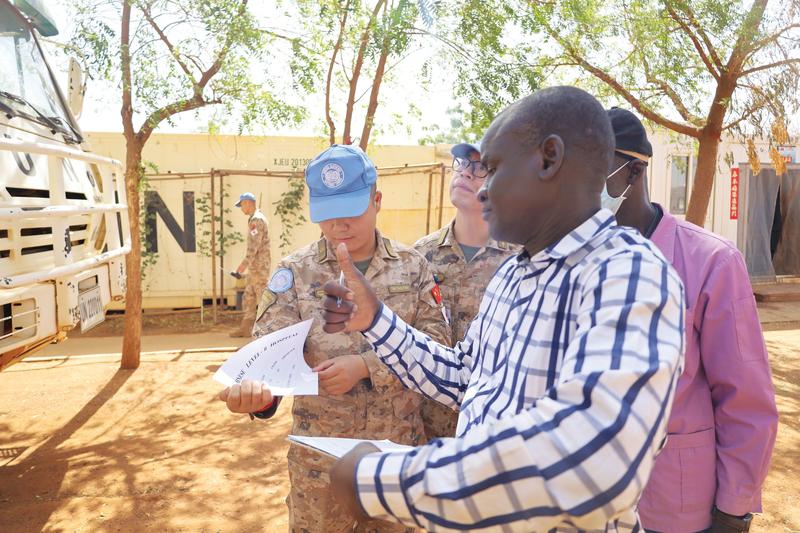Lasting peace, stability, common prosperity achievable through country’s alternative paradigm, analysts say
 A United Nations inspector in Gao, Mali, gives a thumbs-up on Feb 22 after checking vehicles of the 10th Chinese peacekeeping medical detachment to the African country. (PHOTO / XINHUA)
A United Nations inspector in Gao, Mali, gives a thumbs-up on Feb 22 after checking vehicles of the 10th Chinese peacekeeping medical detachment to the African country. (PHOTO / XINHUA)
As confrontation and conflicts widen the world’s deficits in security and peace, analysts said President Xi Jinping’s vision for building a community with a shared future for mankind is essential as people of all countries seek to achieve common security.
Moreover, as the need for more international collaboration and mutual respect continues to grow, China is seen as being fully committed to peace efforts at the global level, including through the Global Security Initiative, which has won the support of more than 80 countries and regional organizations since it was proposed by Xi in April.
Xi’s vision is “the concept of the 21st century”, said Irfan Shahzad Takalvi, president of the Eurasian Century Institute, a think tank in Islamabad, Pakistan.
Takalvi said that the vision is the most potent, pertinent and purposeful concept of the century, and it responds to global security and related challenges in a holistic way.
The most important problem in the existing global security architecture is that it is built on the foundation of serving the interests of the powerful, with war becoming big business, Takalvi said. China’s vision presents an alternative paradigm that contributes to finding solutions by which peace and stability are achievable.
Dipankar Banerjee, president of Chanakya Chakra, a New Delhi-based independent forum on foreign and security policies, said, “It is important for the rest of the world to join this endeavor of ‘building a human community’ that will be more peaceful and lead to common prosperity for all countries.”
In his report to the 20th National Congress of the Communist Party of China in October, Xi said, “Only when all countries pursue the cause of common good, live in harmony and engage in cooperation for mutual benefit will there be sustained prosperity and guaranteed security.
“China is committed to building a world of lasting peace through dialogue and consultation, a world of universal security through collaboration and shared benefits,” he added.
Xi’s vision has received positive responses. Peter Thomson, president of the 71st session of the General Assembly of the United Nations, told Xinhua News Agency in 2017 that “building a community of common destiny for mankind to me is the only future for humanity on this planet”.
Banerjee said that the world is at a crossroads “as perhaps never before in history”, and choosing the right path will be critical for the survival of mankind.
Muhammad Faisal, a former research fellow at the China-Pakistan Study Centre at the Institute of Strategic Studies Islamabad, said that in the current international environment, insecurity has spread due to the “sharpening great power competition and resurgence of regional conflicts”.
This has been compounded by the revival of bloc politics, NATO’s expansion to Russia’s doorstep and permeation into Asia, and the establishment of new arrangements between countries, such as AUKUS, formed by Australia, the United Kingdom and the United States, and the Quadrilateral Security Dialogue, or QUAD, involving the US, Japan, Australia and India, he said.
In addition, on Feb 13 and 14, NATO and the Republic of Korea held their first military talks in Seoul, according to Yonhap News Agency.
“In this era of sharpening alignments, international peace and security can only be safeguarded through open communication and pursuing confidence-building measures between all sides,” said Faisal.
Woo Su-keun, head of the Institute of East Asian Studies of Korea in the ROK, said countries must be more open and supportive when interacting with others to build a human community with a shared future and work on the Global Security Initiative.
China’s path to universal security has been highlighted by the GSI. While addressing the opening of the Boao Forum for Asia via video link in April, Xi said, “It is important that we stay committed to the vision of common, comprehensive, cooperative and sustainable security, and work together to maintain world peace and security.”
At the Lanting Forum in Beijing on Feb 21, Foreign Minister Qin Gang said that security is a legitimate right of all countries and “should not be monopolized by certain nations”.
China’s vision and the GSI focus on dialogue and cooperation instead of the military deterrence and conflict often used by security alliances like NATO, said Zhang Yun, an associate professor of international relations at Niigata University in Japan.
Umer Karim, an associate fellow at the King Faisal Center for Research and Islamic Studies in Riyadh, Saudi Arabia, said a human community with shared goals of prosperity and development is key to global peace.
However, Karim sees the emergence of competition between great powers as seriously jeopardizing global peace. The conflict in Ukraine, he said, is part and parcel of this “wrangling between great powers in order to shape a new and favorable world order”.
Woo, the ROK researcher, who is also president of the Korea-China Global Association in Seoul, said that based on the spirit of respecting differences and living in harmony, the main method to a shared future is that “we can communicate and form sincere dialogues”.
“We should keep in mind that it is not wrong for other countries to think and act differently from us.”
Contact the writers at kelly@chinadailyapac.com


